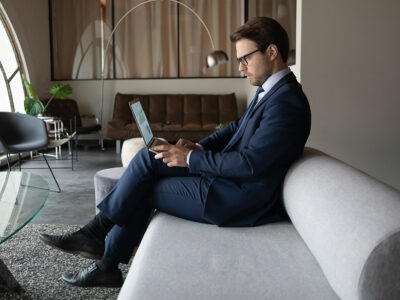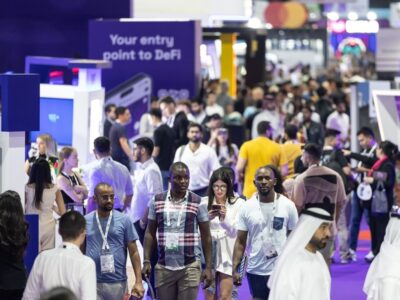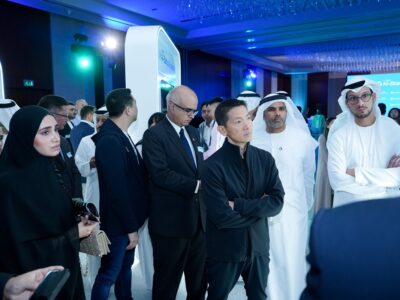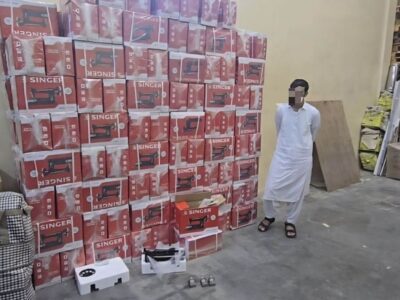After working with the UAE national football team for 16 years, Patrice Coutard became the first in the region to apply heart rate monitors on players to observe their performance, going on to implement player-specific programmes to improve their stamina.
During the process, however, he faced difficulty explaining the readings to the players, as the output was in an Excel format that the players did not engage with.
Together with Tariq Hussain, Coutard went on to build a user-friendly dashboard using simple charts and tables, realising meanwhile that it could be applied to people outside of professional sport to achieve their own personal fitness goals and monitor their health. Shortly afterwards Bodyo was born, and with it health analysis pods that read vitals measurements and provide users with personalised nutrition and training plans. The software is so advanced, the firm claims, that it can study social behaviours based on pictures posted or places visited to offer sustainable solutions that are already habitual or aspirational to the individual.
The ‘AiPods’ were selected by the Dubai Future Foundation for the Future Accelerator programme and will roll out across a 12 month pilot period within six government entities in August. If they succeed, they will be placed in spaces ranging from malls to gyms and offices.
Arabian Business sits down with Tariq Hussain, CEO of the Dubai-based start-up, to discuss the self-funded concept, which he says will expand beyond the UAE to the GCC, Europe, US and Asia in the next five years.
Do you find the health space in the UAE to be saturated?
There are tonnes of successful health-related concepts in the market, but we see a gap in providing insights and a lifestyle change rather than quick fixes. For example, we all know that diets work, but more often than not, people can’t maintain rigorous plans over a sustained period of time. Fitness wearables are also great, but what does it actually mean when you have walked 10,000 steps?
Fitness wearables are great, but what does it actually mean when you have walked 10,000 steps?”
What are some issues in the regional health sector that need to be tackled?
With the almost epidemic rates of fatalities attributed to chronic conditions such as heart disease and diabetes, there is not enough being done to prevent or pre-empt such illnesses. This is partly due to the lack of education and initiatives that engage people on a personal level.
If you could change one thing about the MENA region’s health sector what would it be?
I don’t think there is simple, one-off answer. I believe real change needs to come as a collective, as there are a number of challenges that stem from healthcare professionals, pharma companies, governments, insurance companies, etc. Having said that, if there was a better forum for ideation and collaboration, it would be a good start.
What is your business model?
We’ve kept the model really simple. For users, our standard package is completely free, which allows usage of our AiPod for measuring vitals, access to our app for monitoring and some basic programs for dieting, nutrition and fitness. We also have a premium package which has a much larger selection of personalised programmes and allows users to chat with a nutritionist, PT or healthcare professional. For businesses that want to engage and empower their communities, there is a one-off yearly software licensing fee, a monthly fee for leasing the AiPod which includes servicing and maintenance, plus a usage fee, depending on the number of people and the types of programmes selected.
Were you ever afraid to launch your own business?
Not in the beginning. I had a “nothing ventured, nothing gained” attitude. It’s only after you’ve put in your blood, sweat and tears, with zero returns, when fear kicks in after the first 8-12 months and you ask yourself, “Why am I doing this?”
What is one mistake you made with Bodyo that you wish you hadn’t done?
Not finding a CTO from day one. Both Patrice and I are not technical and had relied heavily on advice from people who weren’t necessarily qualified enough to provide us with the right answers. This was very costly in terms of finances and time lost. While this has been resolved, it is a common problem in the Middle East as there is lack of technical talent compared to the US or Europe. If we were in Silicon Valley, we could pick up a co-founder for next to nothing, but here, they are either very rare or will cost you a pretty penny.








